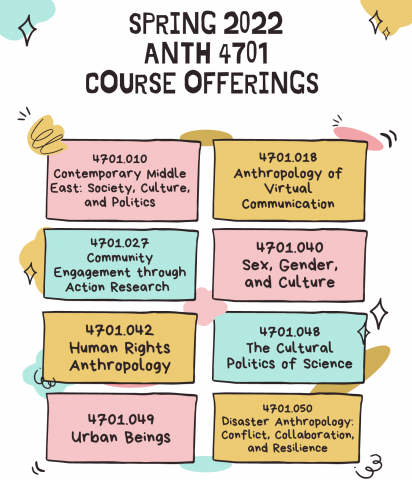ANTH 4701.010: Middle East: Society, Culture, and Politics
Instructor: M. Sadri (Thursdays, 6:00-8:50 PM) Location: CHEM 352
Explores the emergence of the modern Middle Eastern societies from their traditional and early modern origins in "Gunpowder Empires" and Middle Eastern encounters with "modernity", Colonial powers, and the contested native postures toward them.
ANTH 4701.018: Anthropology of Virtual Communication
Instructor: C. Wasson (T/Th, 3:30-4:50 PM) Location: LANG 214
How anthropologists approach the study of virtual communication; exploration of virtual communication practices in different cultural contexts; how virtual communication can be a resource for social processes ranging from political activism to gaming.
ANTH 4701.027: Community Engagement through Action Research
Instructor: M. Nunez-Janes (Wednesdays, 2:00-4:50 PM) Location: LANG 302
Focuses on various approaches to action research by engaging the community as experts and active collaborators and by thinking about and doing anthropology differently. Action oriented learning and research to create social change attempting to democratize the process of research and the relationships between the university and community.
ANTH 4701.040: Sex, Gender, and Culture
Instuctor: J. Carrington (MW, 2:00-3:20 PM) Location: GATE 142
Focuses on the development and current-day practices of feminist anthropology, with special attention to significant theories, themes of study, and debates within the field. Critical analysis of the social construction of sex/gender and deeper understanding of the ways that categories of sex/gender are constructed in and through cultural norms about sexuality, race, ethnicity, indigeneity, class, and nationality.
ANTH 4701.042: Human Rights Anthropology
Instructor: K. Wren (T/Th, 12:30-1:50pm) Location: GATE 049
Focuses on the events that led to the burgeoning of human rights as a concept and as something in need of protection. Evaluates human rights theories and practices, and examines the global, regional, and local ideologies and doctrines at the heart of human rights violations and studies across the globe.
ANTH 4701.048: The Cultural Politics of Science
Instructor: C. Cecale (T/Th, 11:00 AM-12:20 PM) Location: GATE 049
This seminar introduces students to the field of Science and Technology Studies (STS), through an anthropological lens. Together we will explore the effects science and technology have on society, and vice versa, how society impacts the scope, development, and practice of science and technology. Over the course of the semester, students will engage with topics such as biohacking, food science, digital platforms, legal issues, knowledge production, and grapple with what it means to be an expert. Further, we will explore how purportedly neutral fields and practices are actually deeply affected by issues of gender, sexuality, religion, race, and colonialism. While predominately social scientific in nature, this class is open to all students, including people from the humanities and STEM fields.
ANTH 4701.049: Urban Beings
Instructor: J. Johnson (MW, 3:30-4:50 PM) Location: GATE 142
Examines the human experience in cross-cultural urban contexts from an anthropological perspective. Balancing materialist and ideological explanations of sociocultural arrangements, ethnographic readings and case studies showcase stunning diversity and surprising similarity in urban dwellings and dwellers. Students will conduct independent research analyzing urban beings in the DFW Metroplex.
ANTH 4701.050: Disaster Anthropology: Conflict, Collaboration, and Resilience
Instructor: K. Griffin (Mondays, 6:00-8:50 PM) Location: LANG 310
This course explores anthropological approaches to the social experience of disasters, both "natural" and human-made. We will cover a range of factors impacting human security including climate change, environmental pollution, war and political violence, and social inequity. Incorporating perspectives of local peoples worldwide in historical and contemporary settings as well as government and transnational organizations' approaches, this course focuses on the social dimensions of risk, vulnerability, security, and well-being, as well as various strategies for responding to disasters.
